If you go to career fairs suited up and correctly prepared, you may actually get a job out of it. A group of businesses come to your school specifically to hire students. Seeing as this opportunity doesn’t come around often you should treat it as a serious career opportunity. Unfortunately, many students don’t think about what they should say, wear or bring to have a successful day. Instead of showing up to a networking event unprepared and not looking the part, impress recruiters by saying the right things and perfecting your resume beforehand.
Here’s how to actually land a job at the career fair.
Before the Fair
1. Do your Research

“Students should do some research in advance of any career fair to figure out which organizations will be attending the event, learn what those organizations do and discover the types of positions for which they are hiring,” said Director of the Boston College Career Center Rachel Greenberg. Recruiters will want to talk to someone who actually knows their values and mission. Go into the fair knowing who will be there and what skills you have for the positions they want to fill. You will feel so much more prepared if you do your research and don’t walk in blind asking for a job. The recruiters will appreciate your effort.
2. Perfect your resume

Update your resume with relevant information. Include experience and skills you’ve learned in class if you don’t have a ton of experience. Many schools have resume seminars. Take advantage of this resource to create a professional resume. You should bring about 20 copies of your resume to the fair and hold them in a sleek and professional padfolio. The last thing you want is to run out of resumes when you get to one of your top companies’ tables.
3. Practice your lines

Speaking knowledgeably about your experiences and how you can benefit company XYZ will impress recruiters. “I would practice what to say for about my skills and experiences, including what occurred during my jobs in the past,” said Syracuse freshman Sarah Spitzer. Start by saying “My previous experience with ____ taught me ____ skills and has prepared me for the position you are looking to fill.” Walking in with a game plan will make you much less nervous.
4. Create an elevator pitch

You only have a few minutes with job recruiters to sell yourself, so have a few succinct lines ready. “Start with your name, mention one to two strengths that relate to the position you are seeking (refer to your research about the organization here), and then ask an open-ended question to get the conversation started,” said Greenberg. This pitch kicks off the whole conversation, so make sure you start on the right foot. And remember, it should be quick enough to say during a ride in an elevator.
5. Prep to Answer Key Questions

Wondering what kind of questions you’ll be asked at career fairs? “What type of position are you looking for? What are your short-term career goals? What locations are you open to? What are you passionate about?” said Enterprise Rent-a-Car recruiter Ashley Pickhinke. These are typical questions and this inside scoop should help you prepare thorough and unique answers.
6. Make a LinkedIn

The perfect way to connect with recruiters after the fair? LinkedIn. To keep relationships alive and make sure recruiters remember you, follow-up. Set up your LinkedIn before the event. It takes five minutes and makes you look professional and prepared. Snap a professional photo to upload for your headshot, not a Snapchat from the bar last night.
7. Attend Pre-Events

Schools often hold events before career fairs that center on creating resumes, interview tips and info sessions about the fair and who will be attending. Take advantage of these events that give valuable information and don’t cost a thing. You’ll go into the career fair feeling more prepared and confident than everyone else.
8. Suit Up

Your looks instantly create recruiters’ first judgments about you. Make sure they think, “Wow he/she looks like a hardworking, young professional,” instead of, “Yikes, this student is clearly unprepared and not very serious.” Looking professional means not wearing the same sweatpants you wore to bed and leaving the ripped jeans in your room. “I would wear a blazer with nice pants or a dress and jacket to look professional,” said Syracuse freshman Taylor Steiner.
9. Get in formal work mode

Get all the “ums,” “likes” and “dudes” out of your system before you approach a recruiter. Stand up straight and stop fidgeting with your hair and nails. If you think you might not be dressed formally enough, amp up the formalness of your outfit. You might feel out of place walking around your campus in a business professional suit, but recruiters will know you can be professional. Many times, it’s better to be too fancy than too casual. This step sounds intuitive, but nerves can make us slip into not-so-attractive or formal habits. A conscious effort to eliminate these will not go unnoticed.
10. Edit your social media
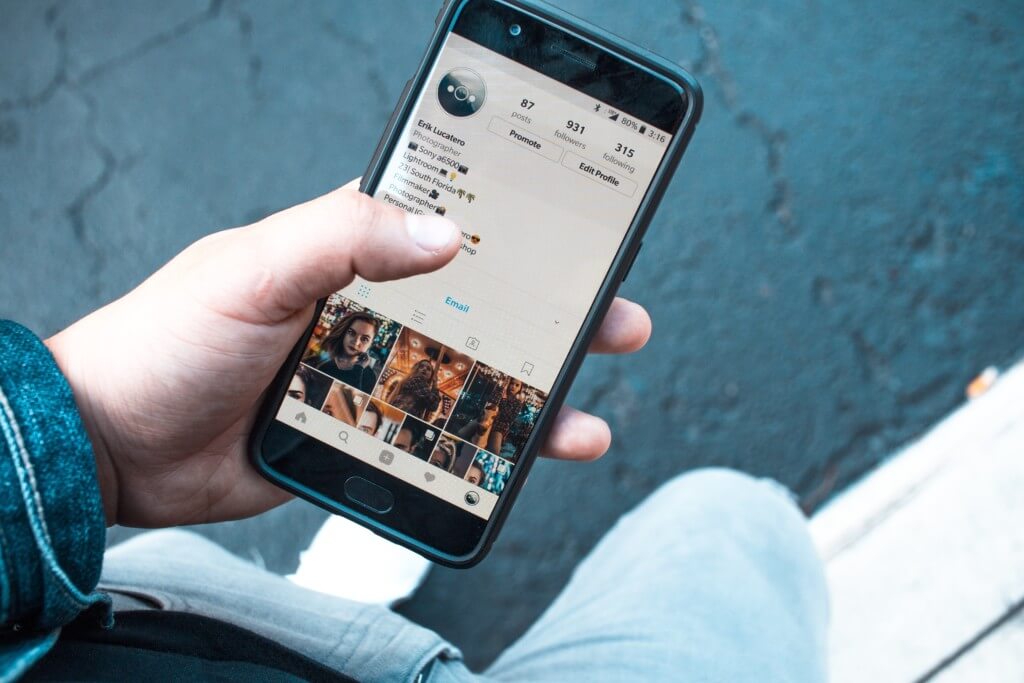
A potential employer should not find pictures of alcohol, partying or other photos that you wouldn’t want your grandma seeing, let alone your future boss. Doing this before the fair will give you confidence when sharing your name with recruiters. If they look you up on Instagram or Facebook they will see only appropriate photos and they’ll know you will represent their company well.
At the fair
11. Don’t be late
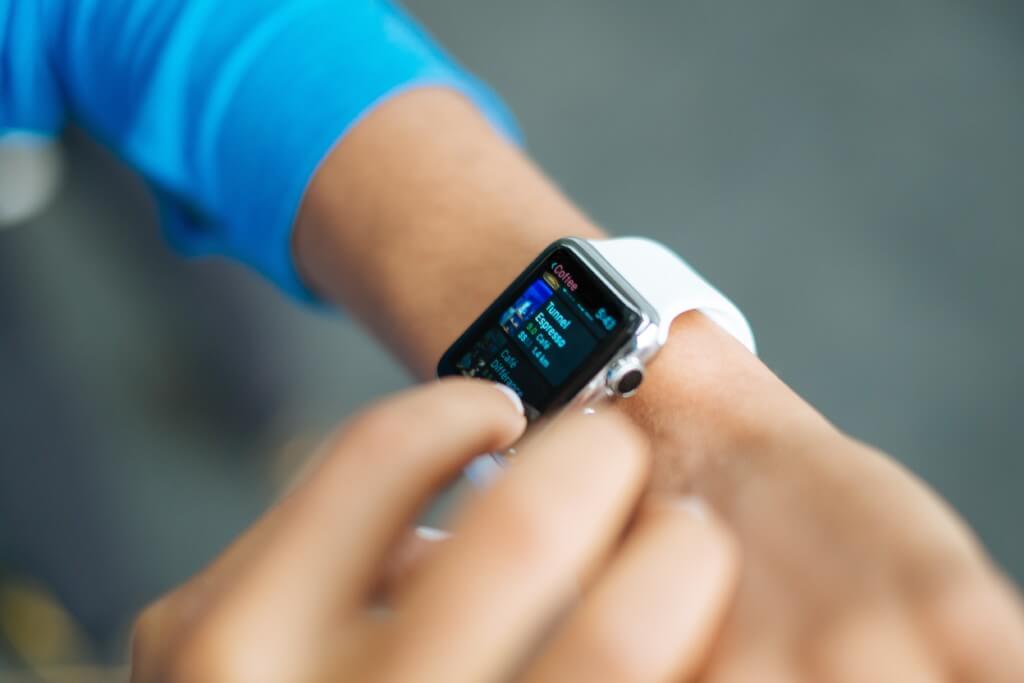
Give yourself enough time to get to the fair. You do not want to walk in late and make a poor first impression. Get there early so you have time to collect your thoughts before talking to possible future employees. You don’t want to be rushed talking to companies so plan enough time in your schedule. Also realize that lunch times are busiest at career fairs, so if you can attend at a different time you’ll have a more relaxed and longer conversation with recruiters.
12. Start with a strong introduction

You should start your conversation with recruiters with a friendly hello, your name, major and position your interested in. It would be pretty awkward if you forgot to include your name and they asked you later on, so make sure you remember. Smile and make your intro quick, so you can get into the more important things ASAP… you’ll only have about five minutes with each recruiter. Impress them before they meet with the next student.
13. Practice on the companies you’re not interested in
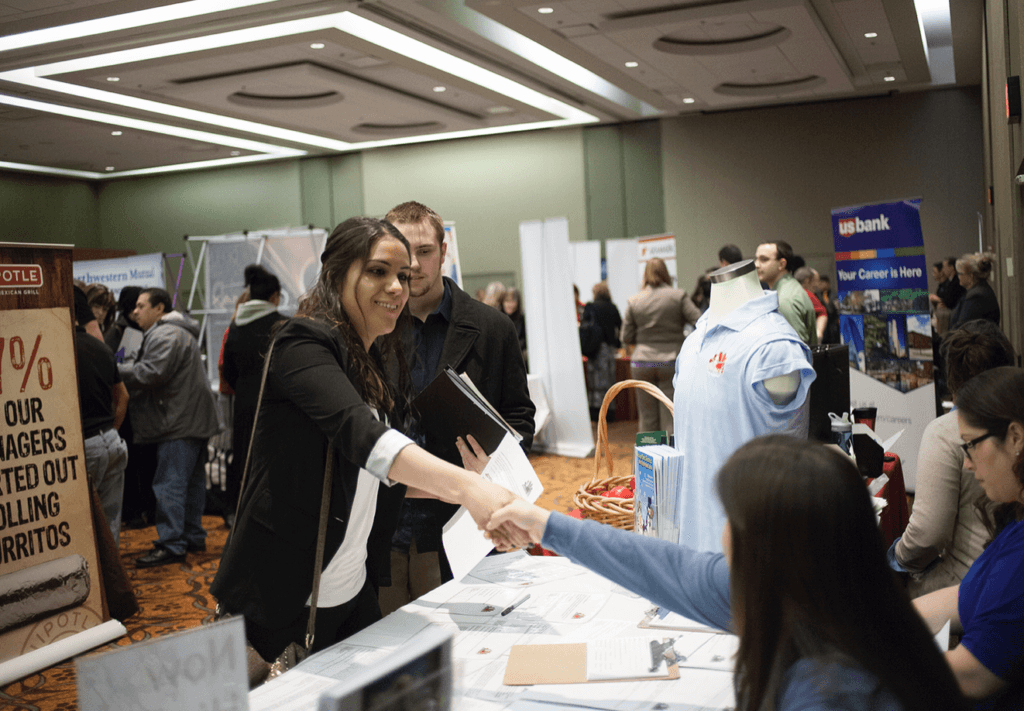
Thanks to your research you know which companies are attending and which you want to speak to ASAP. Instead of heading straight to these tables, go to one or two that you aren’t interested in to get comfortable. If you aren’t actively searching for a job or internship, still attend the fair to become familiar with how they work. “It was my first semester freshman year so I didn’t intend on talking with anyone and just wanted to check it out,” said Syracuse freshman Olivia Peck. Attending fairs and gaining experience at tables who don’t pique your interest in will make you feel more confident when the time comes for you to impress.
14. Hand over a business card
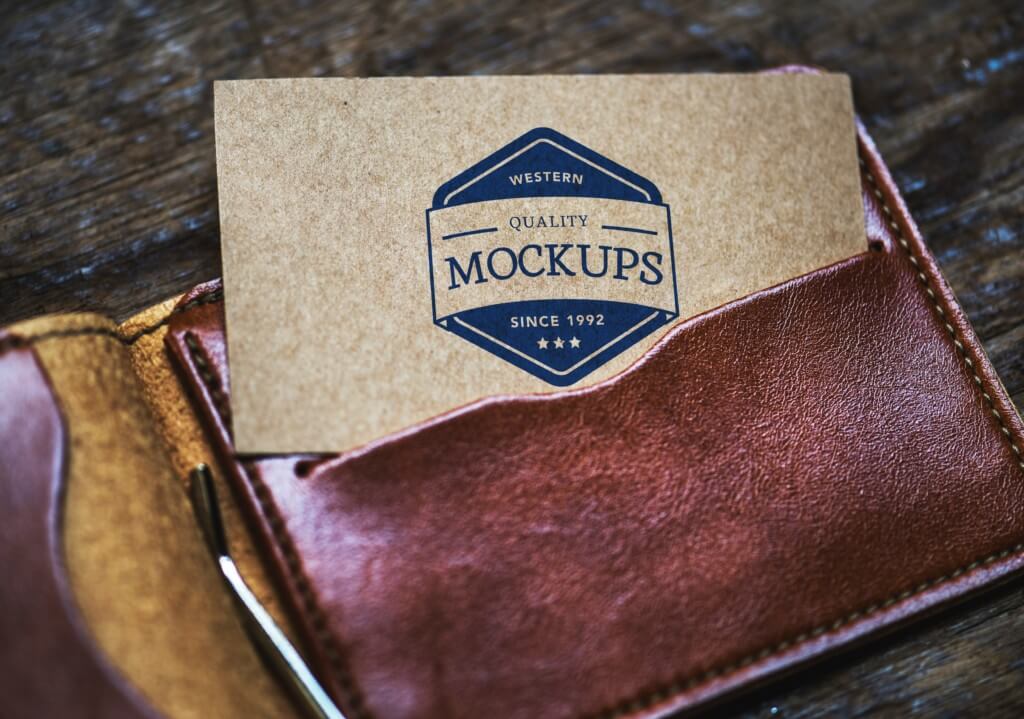
Business cards can be a physical representation of yourself. It will make you memorable and stand out. Companies that have your business card to refer to will remember your name and be more likely to follow up with an interview. This personal business card should include your name, email, phone number and either your major or what area of work you are interested in. You can find many online websites such as VistaPrint that specialize in making business cards and they don’t cost much.
15. Take notes
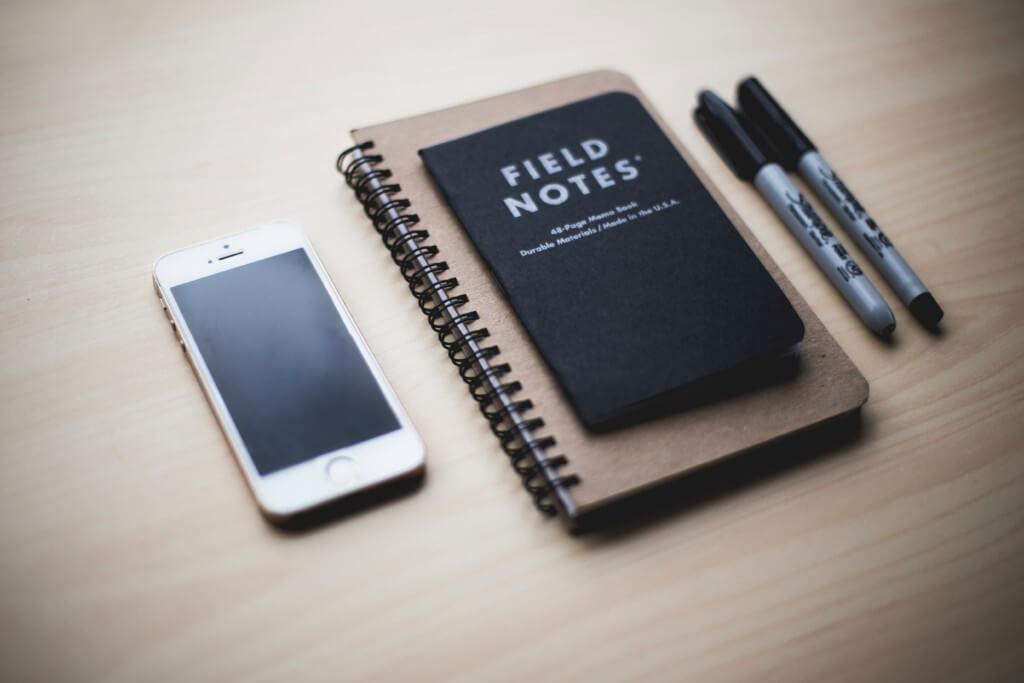
Companies can easily blend together when you talk to 10 in a span of an hour. Take notes on what you like and don’t like about the companies, as well as important information and contact info. This will help you remember your interactions once you leave the fair. These contacts will also come in handy when reaching out afterwards.
16. Get recruiters’ cards

Don’t leave without asking the recruiter for his/her card. This will ensure at least one direct contact with the company that will come in handy later. It will also give you a name when sending a follow up email or thank you note. Emails addressed to specific people are more likely to be read by companies (especially large ones) than emails addressed to “those whom it may concern.”
17. Ask Questions

Have questions prepared about companies you are interested in. This will show you did your research and have interest in a possible job. You can ask questions like, “What would the daily work environment for this position look like?” or “What are the biggest benefits of working for this company?” Asking questions like this assures that you are strongly considering the company as an option to work at, and you want to make sure you fit in with the culture.
18. Network
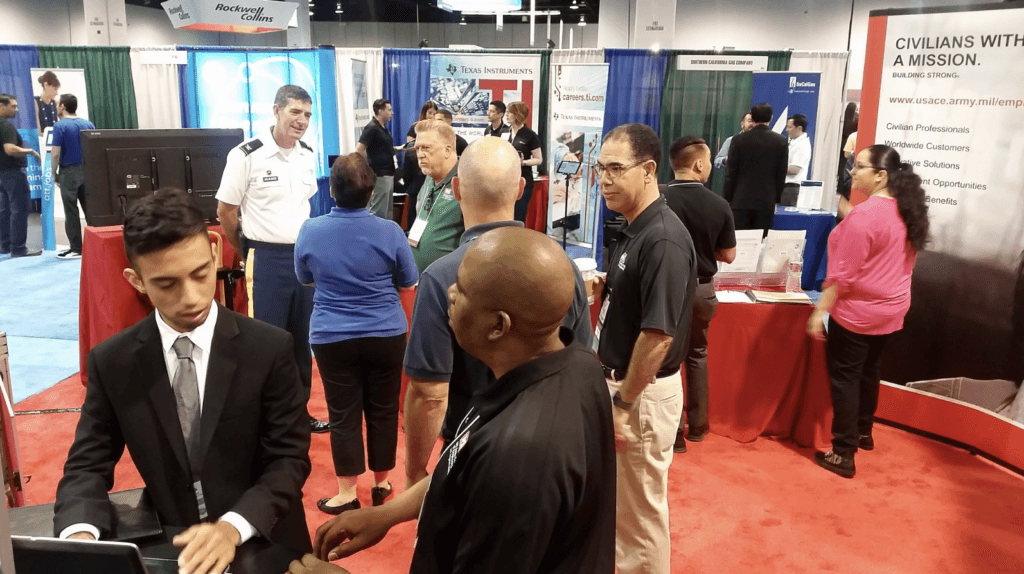
Network with everyone at the fair, not just the recruiters. There will be other students and possibly some professors there all talking about jobs and internships. You never know who could help you get a future job or give you an invaluable connection to your dream internship.
After the Fair
19. Stay Connected

Recruiters realistically will not remember your name and qualifications after a five-minute conversation. Follow up after the fair with an email including your resume and enthusiasm about the company. Connect on LinkedIn and do anything you can to make the recruiters remember you.
20. Send a Thank You Letter

Sending a thank you letter will set you apart from the usual applicant. You will again remind them of your name and interest in their company and be able to address a specific person — the recruiter. The key to keeping connections alive is follow up, so after you send an email send a physical thank you letter and you are sure to stick in their mind.
21. Prepare for the open Positions you want

You now have more knowledge about what positions are available. Use that. “A lot of times I have students come up to me who are able to tell me what year my company was founded, but not the position I am hiring for. Make sure to check out HireAHawk (or your schools’ employment website) and the website for each company you are wanting to talk to at the fair,” said Pickhinke. This knowledge will impress recruiters and you are sure to stand out amongst your competition. Once you know more than that the position is open, prep to fill it with the info you got from the recruiter and soon you’ll have your name on the desk.
How To Sell Yourself At Job Fairs
Written by Rosella Eleanor LaFevre, sophomore, Temple University
A job fair is not the time for companies to pitch themselves to jobseekers, but for jobseekers to pitch themselves to the companies, said expert Kathy Siravo, product and event supervisor at the Philadelphia Inquirer, Daily News and philly.com. “The most important thing students need to bring to a job fair is their A-game,” said Rachel Brown, director of Temple University’s Career Center. Take a few steps to put your best self forward.
Step 1: Research
According to Siravo, whose job involves the organization of job fairs, the first step is to do your research. “We have a website for each of our job fairs where we list the companies who will be present,” Siravo said. Most job fairs should have a list of presenters available online. Before attending the event, research the companies that will have tables at the event, being careful to familiarize themselves with the company’s mission, available positions and the skills you need for those positions.
Step 2: Resume
Another part of your homework is making several copies of your up-to-date resume. When you attend the event, you should keep these in a folder. A big mistake job fair attendees make is handing a folded resume to a recruiter, Siravo said. She was also quick to warn that jobseekers need to make sure their resume is in “tip-top shape,” which means it should be free of grammatical errors, easily readable and tailored to the position you’re seeking.
Step 3: Cover Letter
It’s important to write a cover letter that will accompany your stellar resume. This can be a general cover letter, but it’s best to get more specific. “You can tailor your cover letter for the companies you’re most interested in,” Siravo said. Your cover letter should also be free of grammatical errors; if you need to, ask a friend (or two) to read over it.
Step 4: Elevator Speech
Consider a job fair your interview. Prior to the event, practice an elevator speech—a quick pitch you’ll give recruiters. The product you’re selling is yourself. You’ll often have only two minutes with recruiters which means you’ve got to get to the point quickly. “Quickly engage the recruiter by stating why you are interested in this organization and how you are a great fit [for that organization],” Brown said.
Step 5: Wear Business Professional
It’s also important to dress accordingly. “Your A-game uniform is definitely a neatly pressed business suit,” Brown said.
Step 6: Thank You Note
You should ask every recruiter for a business card, which will come in handy when it’s time to follow up. Following up should begin when you get home from the job fair, according to Siravo. That’s when you should be sure to email the recruiter, reintroduce yourself and mention the fair. Thank them for talking to you and tell them you’ve included an electronic copy of your resume. And of course, remember to attach the file to your email.
Step 7: Follow Up
If you don’t hear back from the recruiter in a week or so, Siravo said you should feel free to follow up again. You can do this by phone. “It never hurts to follow up,” Siravo said.
Step 8: Quality over Quantity
Don’t feel like you need to give your resume to every recruiter at the event. You only need to talk to those whose companies you’re most interested in. As Siravo said, at some fairs this can mean one or two companies. At other fairs, you might be interested in 10 or 15. Your focus should be building quality connections, not simply a quantity of them. Ultimately, your aim is to make a positive first impression. Brown said, “You never have a second chance to make a first impression—make the most of it.” You’ll know you’re successful if you’ve made a connection that continues after the event.
*Updated on April 22, 2019 by Rosella Eleanor LaFevre to include “How To Sell Yourself At Job Fairs.”



















